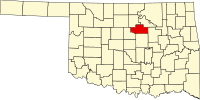Payne County, Oklahoma
| Payne County, Oklahoma | ||
|---|---|---|

Payne County Courthouse
|
||
|
||
 Location in the U.S. state of Oklahoma |
||
 Oklahoma's location in the U.S. |
||
| Founded | May 2, 1890 | |
| Named for | Capt. David L. Payne | |
| Seat | Stillwater | |
| Largest city | Stillwater | |
| Area | ||
| • Total | 697 sq mi (1,805 km2) | |
| • Land | 685 sq mi (1,774 km2) | |
| Population (est.) | ||
| • (2013) | 79,066 | |
| • Density | 113/sq mi (44/km²) | |
| Congressional district | 3rd | |
| Time zone | Central: UTC-6/-5 | |
| Website | www |
|
Payne County is a county in the U.S. state of Oklahoma. As of the 2010 census, the population was 77,350. Its county seat is Stillwater. The county was created in 1890 as part of Oklahoma Territory and is named for Capt. David L. Payne, a leader of the "Boomers".
Payne County comprises the Stillwater, OK Micropolitan Statistical Area. The county lies northeast of the Oklahoma City metropolitan area though many consider it an extension of the Oklahoma City metro area due to commuter patterns and other indicators.
This county was established and named as the Sixth County by the Oklahoma Organic Act of 1890. It included land settled during the Land Run of 1889. The Organic Act settled a dispute between the towns of Stillwater and Perkins over which should be the county seat.
Eastern Oklahoma Railway built two lines in Payne County between 1900 and 1902, then immediately leased them to the Atchison, Topeka and Santa Fe Railway.
In 2010, the Keystone-Cushing Pipeline (Phase II) was constructed into Payne County.
According to the U.S. Census Bureau, the county has a total area of 697 square miles (1,810 km2), of which 685 square miles (1,770 km2) is land and 12 square miles (31 km2) (1.8%) is water.
Payne County is covered by rolling plains, mostly within the Sandstone Hills physiographic region, but with the western part of the county in the Red Bed plains. The county has two significant reservoirs: McMurtry Lake and Carl Blackwell Lake. The Cimarron River and Stillwater Creek drain most of the county.
...
Wikipedia

